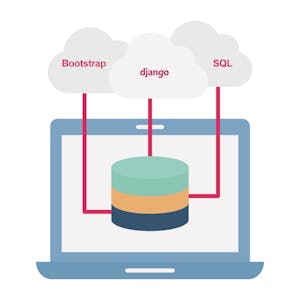Developing Applications with SQL, Databases, and Django
The essentials of application development are accessing, processing, and presenting data. Data is stored in various databases, either on-premise or on the cloud, and developers will need to learn how to talk to them via programming languages.In this course, you will be introduced to some fundamental database concepts. You will learn the basics of SQL, a simple and powerful programming language for querying and managing data. And you will learn about cloud database fundamentals and get hands-on cloud database experiences.
In addition to SQL, you will discover how Object-Relational Mapping (ORM) allows you to use Object-Oriented Programming (OOP) languages to work with databases. You will gain full-stack Django skills by creating a Django web app to persist, process, and present data. And you will learn about cloud app platform fundamentals and get hands-on experience deploying your Django web app on the cloud.
Course Learning Objectives:
- Describe what is a database and how to model data
- Compose SQL queries to insert, select, update, delete data in a database
- Understand Object Relational Model (ORM)
- Employ Django to develop database-powered applications
- Deploy your Django app on the cloud
Prerequisites:
Explain what a database is and create an entity relationship data model for a relational database.
Compose SQL queries to insert, select, update, delete data in a database.
Use Django ORM to build object-oriented databases.
Integrate Bootstrap into your Django template and build interactive web pages.
Syllabus
Syllabus - What you will learn from this course
Week 1
Getting Started with SQL & Relational Databases
Week 2
ORM: Bridging the Gap Between the Real World and Relational Model
Week 3
Full-stack Django Development
Week 4
Consolidate and Deploy Your Django App
Week 5
Final Project: Enhance Online Course App with New Features
FAQ
When will I have access to the lectures and assignments?
Access to lectures and assignments depends on your type of enrollment. If you take a course in audit mode, you will be able to see most course materials for free. To access graded assignments and to earn a Certificate, you will need to purchase the Certificate experience, during or after your audit. If you don't see the audit option:
The course may not offer an audit option. You can try a Free Trial instead, or apply for Financial Aid.
The course may offer 'Full Course, No Certificate' instead. This option lets you see all course materials, submit required assessments, and get a final grade. This also means that you will not be able to purchase a Certificate experience.
What will I get if I subscribe to this Certificate?
When you enroll in the course, you get access to all of the courses in the Certificate, and you earn a certificate when you complete the work. Your electronic Certificate will be added to your Accomplishments page - from there, you can print your Certificate or add it to your LinkedIn profile. If you only want to read and view the course content, you can audit the course for free.
What is the refund policy?
If you subscribed, you get a 7-day free trial during which you can cancel at no penalty. After that, we don’t give refunds, but you can cancel your subscription at any time. See our full refund policy.
Reviews
Excellent course. Having some background in Python and databases, one can start building Django applications at once.
this course made me fullstak developer
Thanks foorfor all staff that doing this greetGreet job specially the labs which gives me an experiance to emplementing any site and webWeb application
This is a Good course no doubt , makes you familiar with Django , SQL, ORM , DBMS and depolying
Thanks Coursera...
Developing Applications with SQL,Databases and Django provided a confidence and good experience in IBM cloud knowledge skills,which helped me to prepare for IBM cloud certification exams
